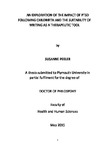An exploration of the impact of PTSD following childbirth and the suitability of writing therapy as a therapeutic tool
| dc.contributor.supervisor | Skirton, Heather | |
| dc.contributor.author | Peeler, Susanne | |
| dc.contributor.other | Faculty of Health | en_US |
| dc.date.accessioned | 2015-07-28T10:00:23Z | |
| dc.date.available | 2015-07-28T10:00:23Z | |
| dc.date.issued | 2015 | |
| dc.identifier | 10206187 | en_US |
| dc.identifier.uri | http://hdl.handle.net/10026.1/3463 | |
| dc.description.abstract |
Background: Postnatal PTSD affects between 1 and 6% of women, whereas 30% are partially symptomatic. The mental health of new mothers is of public health concern as it could affect the marital relationship and the behavioural and emotional health of children. Little research has explored emotional regulation difficulties as predictors for postnatal PTSD. Treatments such as Cognitive Behavioural Therapy (CBT) have long waiting list times and may be hard to access for new mothers. Aim: The relationship between key predictors especially those associated with emotional regulation and PTSD in postnatal women was investigated. The feasibility of using internet based writing therapy for women with postnatal PTSD was assessed. Exploration of women's views about writing therapy as a therapeutic tool and their lived experience of PTSD was undertaken. Methods: Two literature reviews were conducted; firstly to identify the types of therapy previously used for women with postnatal PTSD, secondly to identify necessary conditions for effective writing therapy. The quantitative phase used measures for key predictors of PTSD and incorporated a feasibility study for a writing intervention. Regression analysis for a variety of predictors and PTSD and general and psychological health was conducted on data from 211 women. In the qualitative phase narrative analysis was used on interview transcripts from seven non-writers exploring access to writing and their experience of PTSD. An in depth case study was conducted on a woman who participated in the intervention and who was interviewed. Findings: The quantitative phase showed that planning the pregnancy; whether the baby slept or fed as expected; maternal confidence; past trauma; attachment patterns; self-efficacy; social support and partner support correlated with PTSD. However, the pain component of the birth experience mediated the effect of affects and alexithymia on general and psychological health. Most women did not access writing therapy. The qualitative phase showed that complicating factors and relationships with staff and mothers affect women's experience of PTSD and their view of themselves. Social media was used by women for support. Conclusion: Emotion regulation difficulties could impact postnatal mental health. Antenatal screening for alexithymia may be useful. Women value good relationships with staff during labour. The role of social media for postnatal mental health support should be investigated. | en_US |
| dc.language.iso | en | en_US |
| dc.publisher | Plymouth University | en_US |
| dc.subject | Postnatal | |
| dc.subject | Childbirth | |
| dc.subject | Trauma | |
| dc.subject | Birth | |
| dc.subject | Postpartum | |
| dc.subject | Distress | |
| dc.subject | Mental health | |
| dc.subject | Writing therapy | |
| dc.subject | PTSD postraumatic stress disorder | en_US |
| dc.title | An exploration of the impact of PTSD following childbirth and the suitability of writing therapy as a therapeutic tool | en_US |
| dc.type | Thesis | |
| plymouth.version | Full version | en_US |
| dc.identifier.doi | http://dx.doi.org/10.24382/4664 |
Files in this item
This item appears in the following Collection(s)
-
01 Research Theses Main Collection
Research Theses Main


